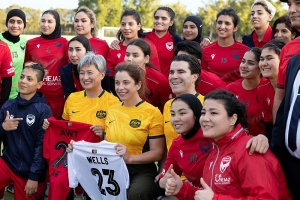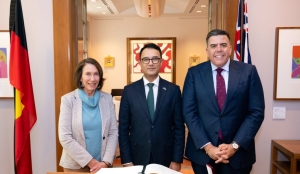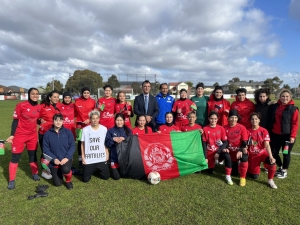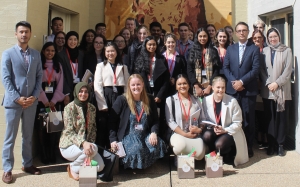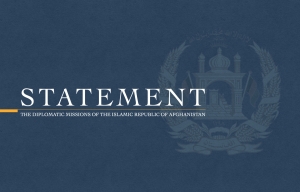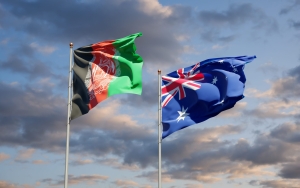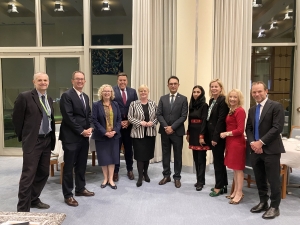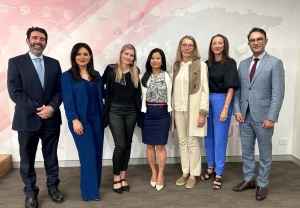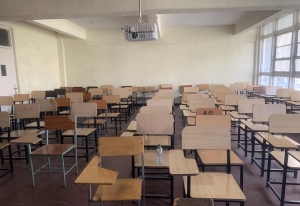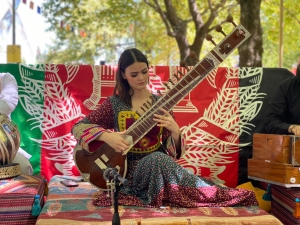On 8th May 2023, it was a momentous occasion as Ambassador Wahidullah Waissi had the privilege of meeting the Speaker of the House, Hon Milton Dick and the President of the Senate, Senator the Hon Sue Lines, at the Parliament of Australia in Canberra. The discussions held during this remarkable gathering delved into a wide range of crucial topics, including the current situation in Afghanistan, pressing human rights concerns, and the urgent humanitarian crises afflicting the nation after the take over of Afghanistan by the Taliban military group. The meeting provided a vital platform for constructive dialogue and information sharing on these critical issues.
During this meeting at the Parliament of Australia, Ambassador Waissi expressed their delight in meeting the distinguished President of the Senate and the esteemed Speaker of the House. The exchange revolved around the prevailing conditions in Afghanistan, with a particular focus on the human rights challenges facing the country. Additionally, the meeting addressed the dire humanitarian crises that demand immediate attention and concerted efforts. The discussions served as an opportunity to engage in meaningful conversation and foster understanding between Ambassador Waissi and the esteemed representatives, fostering the groundwork for potential collaborative endeavors to address these pressing issues.
Ambassador Waissi seized the chance to converse openly and earnestly about the critical state of affairs in Afghanistan. Both the Speaker of the House and the President of the Senate expressed their full support to the people of Afghanistan during these difficult days and times, reaffirming their commitment to aid and solidarity.
Notably, it was the first and joint meeting of both the Speaker of the House and the President of the Senate at the Parliament in 2023 with Ambassador Waissi on 35th Anniversary Openning of Australia's Parliament House. The convergence of such high-ranking officials underscored the importance of the discussions held, emphasizing the gravity of the issues discussed and the commitment of Australia's parliamentary leadership to engaging constructively on matters of global concern.
To commemorate the occasion and express solidarity, Ambassador Waissi signed the book of memories, leaving behind a tangible symbol of unity and cooperation. The meeting's outcomes and shared dedication to addressing the challenges faced by Afghanistan promise to spark renewed efforts and cooperation, bolstering hopes for a brighter and more stable future for the nation and its people.
Melbourne, 18 July 2023 - On the momentous occasion of the Inaugural Hope Cup, held on July 18th, 2023, the Afghan Women's Football Team showcased their indomitable spirit and unwavering determination in a heartwarming display of sportsmanship. Despite the challenges they faced due to lack of support from FIFA, the team's participation in this historic event was a true testament to the power of hope and resilience.
The Inaugural Hope Cup marked a significant milestone for the Afghan Women's Football Team, as they played in a friendly match that symbolized their determination to overcome adversity and prove that sport is for all, regardless of gender or background. Despite the absence of official recognition and support, the team's dedication to the game shone through, inspiring spectators and fellow athletes alike.
Ambassador of Afghanistan, HE Wahidullah Waissi, was present at the event and commended the players for their courage and commitment to their passion. In his speech, he emphasized the importance of creating equal opportunities for women in sports and called for a more inclusive approach from FIFA and other governing bodies. The Ambassador's words resonated deeply, adding weight to the significance of the Inaugural Hope Cup and its potential to bring about positive change.
The atmosphere during the match was filled with excitement and encouragement as fans from diverse backgrounds came together to support the Afghan Women's Football Team. The players' skills and teamwork were on full display, captivating the audience and leaving a lasting impact on the world of sports. Beyond the competition, the event highlighted the transformative power of sports in empowering individuals and fostering unity among communities.
As the Inaugural Hope Cup came to a close, it marked not only a celebration of the Afghan Women's Football Team's achievements but also a call to action for greater inclusivity and support for women in sports globally. The event exemplified the potential of sports to inspire hope, break barriers, and create lasting change, urging stakeholders to take steps towards a more equitable and diverse sporting landscape.
In conclusion, the Inaugural Hope Cup was a resounding success, with the Afghan Women's Football Team shining as an example of determination and perseverance. Despite facing challenges, the team's participation sent a powerful message of inclusivity and empowerment, proving that sports have the ability to transcend boundaries and foster a sense of hope for a better future. Let this event be a catalyst for change, as we strive towards a world where opportunities in sports are accessible to all, regardless of gender, nationality, or circumstance.
19 April 2023 - The Embassy of the Islamic Republic of Afghanistan in Canberra recently welcomed a group of students from Macquarie University's Global Leadership Program as part of their annual symposium. Eager to learn from practice of diplomacy, these Sydney-based university students convened with Ambassador Wahidullah Waissi for a thought-provoking session. The event provided a unique platform for the students to gain firsthand knowledge and insights into Afghanistan's current affairs and the challenges the nation faces.
During their conversation, the students and Ambassador Waissi engaged in discussions about Afghanistan's ongoing challenges, its future prospects, and the role of diplomacy in addressing these issues. The Ambassador shared his expertise on diplomacy and global affairs, offering valuable insights into the intricacies of international relations and the role of diplomacy in navigating today's complex world. This dialogue allowed the students to ask questions and engage in meaningful conversation, deepening their understanding of the issues at hand.
The session at the Embassy of the Islamic Republic of Afghanistan in Canberra is a testament to the Global Leadership Program's commitment to providing its students with enriching experiences and valuable learning opportunities. With its focus on cultivating future leaders, the program plays a crucial role in shaping the international landscape for years to come.
Statement of the Diplomatic Missions of the Islamic Republic of Afghanistan
World Health Day 2023: A Call to Action for Afghanistan
April 7th, 2023
As we observe World Health Day on April 7th, 2023, the Diplomatic Missions of the Islamic Republic of Afghanistan express grave concerns about the increasing health challenges faced by the people of Afghanistan. This day serves as an opportunity to reiterate the importance of equitable access to quality healthcare as a fundamental human right, which has been severely impacted by the Taliban takeover of Afghanistan.
The Taliban's forced seizure of the Afghan administration has far-reaching effects on the Afghan people's health and well-being. Maternal and child disease and casualty rates have risen, showing a lack of capacity and assistance on the part of the Taliban. It is critical to recognise the significant advances made in healthcare between 2001 and 2021. Sadly, these hard-won gains are under jeopardy, with potentially dire consequences for the people of Afghanistan.
A particularly concerning development is the prohibition on female staff in national and international Non-Governmental Organizations and the UN agencies, which has led to a significant reduction in the availability and reach of health services for women and children. The World Health Organization’s Emergency Situation Report (February 2023) reveals a 10% increase in maternal mortality rates and an 8% rise in neonatal mortality rates. The report further indicates that 70% of health facilities in Afghanistan are non-functional due to insufficient staffing, funding, and security.
In light of these pressing challenges, the Diplomatic Missions of the Islamic Republic of Afghanistan call on the international community to advocate for the reinstatement of female healthcare workers in national and international NGOs and the UN agencies, to allocate increased international funding and support for the strengthening of Afghanistan's healthcare infrastructure, to foster collaboration among donor agencies, international organizations, and local stakeholders to ensure the provision of essential healthcare services, and to implement a monitoring mechanisms to guarantee the functionality and accessibility of equal healthcare distribution for all Afghan citizens.
In conclusion, on this World Health Day, the Diplomatic Missions of the Islamic Republic of Afghanistan call upon international organizations to recognize the healthcare crisis faced by the Afghan people and to collaborate to realize the goal of "Health for All" for the people of Afghanistan. It is our collective responsibility to ensure that everyone, irrespective of their circumstances, has access to quality healthcare, and that the progress achieved in recent years is not lost amidst the current challenges.
March 30th marks the 54th anniversary of the diplomatic relationship between Afghanistan and Australia - a journey reflecting unwavering commitment and enduring friendship. Over five decades, Australia has been a steadfast supporter of Afghanistan, playing a crucial role in reconstruction through diplomatic, defense, and development efforts. The Afghan diaspora in Australia and the historical connection with Afghan Cameleers further strengthen the bond between our two nations.
As we reflect on this auspicious occasion, we acknowledge the challenges Afghanistan currently faces, especially following the Taliban's takeover. The ensuing devastation has led to widespread unemployment, extreme poverty, and a mass exodus of talent. The Taliban's extremist practices have deeply affected Afghan society, particularly girls and women.
Australia's contributions have been invaluable, including its sacrifices in human lives, financial resources, and support during Afghanistan's challenging times. The country has provided significant humanitarian assistance, welcomed Afghan refugees, and fostered educational opportunities.
With deep appreciation and gratitude, the Embassy of the Islamic Republic of Afghanistan in Canberra expresses its heartfelt thanks to the Government and people of Australia for their unwavering support over the past two decades, especially during the challenging times following the events of August 15th, 2021. As we celebrate our 54th anniversary, we reflect upon the flourishing diplomatic relationship that we have built and pledge to preserve its strength for future generations to come. Let us work together to enhance and deepen our connection as we look forward to a bright and prosperous future.
Together, let's continue to deepen our connection and work towards a brighter, more prosperous future. #AfghanAusRelations #StrongerTogether
On the auspicious occasion of Nowruz, signifying new beginnings, Ambassador of the Islamic Republic of Afghanistan, HE Wahidullah Waissi, participated in the re-inauguration of Afghanistan's Friendship Group at the Parliament of Australia. Co-chaired by Hon Mr. Julian Hill and Hon Mr. Andrew Wallace, the event saw the attendance of Member of Parliaments, including the Speaker of the House, in solidarity with the people of Afghanistan. The Ambassador expressed his heartfelt appreciation for the Australian government's unwavering support and assistance to the Afghan people, particularly in providing humanitarian aid and accommodating Afghan refugees.
Ambassador Waissi highlighted the devastating impact of the Taliban's takeover on Afghanistan's economy, education, and human rights, particularly on girls and women. Despite these setbacks, he conveyed hope that the international community, including Australia, would work together to create a brighter future for Afghanistan.
By acknowledging key challenges for the Afghans inside and in diaspora, the participated MPs expressed their solidarity and support with the people of Afghainstan. The Ambassador concluded by reaffirming the Embassy of Afghanistan in Canberra's commitment to work towards a peaceful and prosperous future for Afghanistan. He expressed his gratitude to all for their continued support and solidarity with the Afghan people and looked forward to working together for a brighter future for Afghanistan and its people.
On International Women's Day, the Australian Strategic Policy Institute hosted a panel event on women, peace and security, with a focus on the role of women in conflict and protest movements. The event saw the participation of Ambassador Wahidullah Waissi and members of the diplomatic corps. The panel discussion highlighted the pivotal role of women in advocating for social change, protecting human rights, and ensuring peace and security.
Speakers at the event included Shaharzad Akbar, Her Excellency Ms Pernille Kardel, Maryam Zahid, Sophie McNeill, Ms Gai Brodtmann, Mon Zin and Nos Hosseini. They discussed the challenges women face in conflict and protest movements, including threats of sexual violence and the impact on families. The panel also emphasized that when women are involved in conflict resolution and peace negotiations, the peace and stability that follows is significantly more likely to be successful and enduring.
The event focused on the resilience and dedication of women to protect, defend and strengthen society, and how women have been mobilising across the world to fight against repression and for freedom. Those who couldn't attend the event in person could register to attend it online.
To watch the event, click here.
Statement of the Diplomatic Missions of the Islamic Republic of Afghanistan on International Women’s Day
8 March 2023


